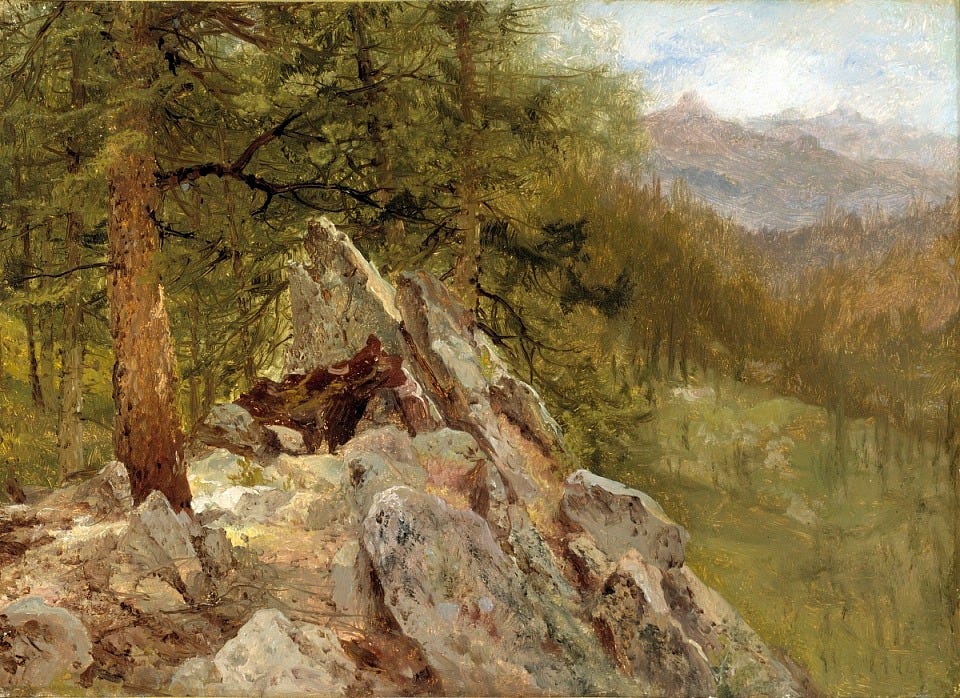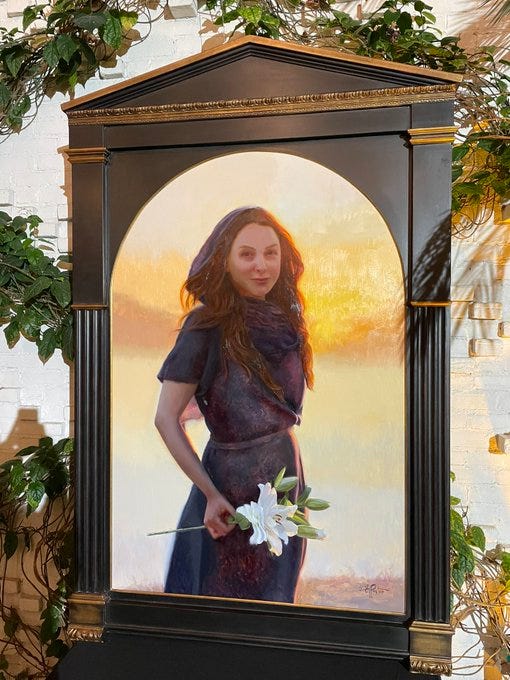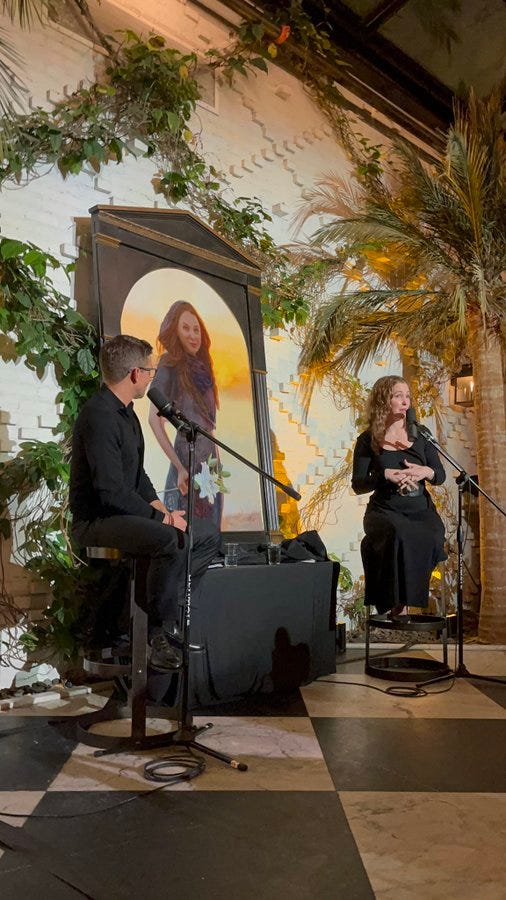A Rare Generosity
A few notes on poetry & prayer
Dear friends,
Emily and I are just back from Tampa, Florida, where she was honored by a remarkable unveiling of her recent oil painting “Mary, Overshadowed.” The work, commissioned by V3, was unveiled in an exceptional event at Tampa’s remarkable Oxford Exchange, and was sold out, standing room only.
The below are not professional pictures, but give a sense for the remarkable weight and power of this project. It is stunning in person, and haunting in a very unsettling-but-good-and-strangely-comforting manner. You can see more at her Instagram page, and I hope to convince her to contribute a guest post here about the process at some point. It’s a significant work, and another joyful piece of evidence that excellent, generational-quality art is being made all around us. This piece will be going next year to select universities and other public settings as part of V3’s intention to cultivate excellent and accessible public art at the highest standards of execution. (If you know of a place that should be considered for a visit, do let us know.)
With everything going on, in the past few weeks I have found it impossible to maintain my former (intended) weekly posting schedule. This has been due to increased work obligations, travel, barreling through and toward various important events and holidays, and some (very exciting!) last work as we bring The Locust Years across the finish line. My apologies for this less-frequent posting, but I know that the subscribers to these dispatches understand these constraints of limited time and energy, especially in this very full time of the year and in my work.
With that said, I am glad to share the below, which I hope is thoughtful enough to make up for it all at least a little bit.
Watch for an exciting update and the opportunity to preorder the new book very soon. Woohoo!
-Paul
A Rare Generosity:
A few notes on poetry & prayer
Attention is the rarest and purest form of generosity.
-Simone Weil
The human being experiences attention as love. Strangely, this extends even to negative attention. It is why a child would, in most cases, rather fight their father than be ignored by him. To pay attention—to see, to hear—is to give one’s presence. This presence has something of eternity in it, and is valuable beyond our understanding of it, and certainly beyond description.
It is this presence that makes the difference between accidental attention and intentional attention. It is one thing to stand in the foyer of a hotel lobby, for an hour, seen by security guards, cameras, bellhops, the Manager on Duty, other guests, and a few cabbies or pedestrians through the glass doors. It is something quite different to sit, even for a fraction of that time, with someone seeing you, wishing to be with you, to walk to talk. The perception of the senses is not enough to be really seen. It is the choice to see, to attend, that is in itself loving and valuable. It’s the application of another’s will. This is so powerful, that we experience it, rightly, as love.
Certain forms of attention are so particularly concentrated that they have the power to reshape us at a fundamental level by bonding us to others. Marriage is one of these. It functions as an exclusionary narrowing of the human faculties of erotic love and sex. Like putting one’s thumb over the end of a garden hose, all the flow of a life is directed, through that stricture, into a force of love through a narrowing of attention. Friendship, especially affectionate friendship, is another. In this relationship, the friend turns to the friend in a mutual joy of camaraderie or understanding which rises above convenience or simply having a good time to achieve a mutually elevating and enlivening effect. Liturgical attention is a third example, in which a formalized worship directs the soul into a ritual setting where the will and faculties of attention are offered as a “living sacrifice” to God. In each of these examples, the narrowing or surrendering of the will helps the human being achieve a far deeper form of intimate union with a particular type of beloved other.
The narrowing or surrendering of the will helps the human being achieve a far deeper form of intimate union with a particular type of beloved other.
In this, we can feel the truth of Weil’s observation that “attention is the rarest and purest form of generosity.” Because marriages and deep reciprocal friendships—soul friendships—are colossally rare. They happen only a few times in the life of the human, if at all. The sacred forms of liturgy may be more frequent, but it is in no way common, and once in a while we are able to encounter it in its rarity and purity. The intimacy of attention that is present in each of these formal and mutual relationships is deeply generous.
Prayer and poetry share significant qualities that achieve and express this intimacy of attention. While they are different in many ways, at their core they are both a means of channeling attention in two directions. In the first case, between the soul and God, in the second, between the poet and the reader. Though their goals and means are quite different, they are fundamentally unitive—a means of mutual gift.
In the remainder of this dispatch, I intend to explore this generosity of attention by examining three vital qualities shared between prayer and poetry that serve to focus the attention and to produce real union and communion through the apparent weakness of words. These qualities are desire, abandon, and faith. Each is responsible for a different aspect of the generosity of Weil’s rare and pure attention. Each of them contribute meaningfully to the knowing and pursuit of genuine love.
Desire
Poetry and prayer share a common root of yearning. In the lowest forms of each this yearning is exceptionally base and selfish. God, if you love me, give me that promotion is a prayer with me right at the very center. It cannot be transposed, no one else could pray it without feeling how cramped it is. Likewise, it is impossible to fully capture the personal claustrophobia of much of contemporary poetry (I will refrain from any specific examples as they hurt me so, and I don’t wish to be negative). In this sort of writing, the me has so metastasized under the hothouse lamps intended to grow the modern self that it becomes something grotesque—a parody of itself. Even the very best of the “me-poets,” the one who founded and perfected the me-poem (Walt Whitman) has a sense of pinching every time he tries to talk about love. Though the language is uniformly beautiful, it is the service of an ugly thing. He is pretzeling himself quite terribly, trying to get better and more novel views of his own navel.
Of course this makes sense. A generosity of attention is when the will-gaze is turned outward. Turning in on oneself (incurvatus in se) is, of course, St. Augustine’s definition of sin. While certainly not all self-gaze is sin, it is, when too prolonged, a sure sign of immaturity, and possibly a form of aesthetic masturbation. Self-pleasuring is possible with a prayer or a poem of course, and unfortunately many of us have been made to witness other people doing it. There is desire in this of course, but it’s the desire of a baby or an adolescent of the species—the fear that a basic need will not be met, or an impatient need for immediate gratification of an appetite.
But in its more mature expressions, great things happen for the pray-er and the poet. A powerful desire—for the distant Beloved, for a fleeting moment of beauty once experienced, for something one cannot fully name—takes hold, and one seeks, through word and image, to pursue and bind it.
The poet's eye, in fine frenzy rolling,
Doth glance from heaven to earth, from earth to heaven.
And as imagination bodies forth
The forms of things unknown, the poet's pen
Turns them to shapes, and gives to airy nothing
A local habitation and a name.
- A Midsummer Night’s Dream
This “local habitation and a name” is where desire leads the seeking soul, and it is, in a way, the outcome of both prayer and poetry. In prayer, we are embodying in our time and our place some crumb of eternity that has been gifted to us. We may pray the Our Father tens of thousands of times in our life, but according the the logic of Borges’ Pierre Menard (author of the Quixote), we will never pray the same prayer twice. One cannot step twice into the same river, and so it is with any of the great human pole vaults above Time. Prayer brings the timeless and all-encompassing into here and into now.
This is, of course, precisely what a good poem does, though it does it “slant,” to quote Miss Dickinson, laying the truth “in circuit.” The poet is led out from himself, through desire, into an encounter with truth or beauty, an encounter which may not be allowed to remain abstract, because it was not experienced abstractly. Instead the poet gives this thing unknown a local habitation. The poet allows the beautiful thing to live here, and now. He names it.
In this, a union is achieved with the “thing.” It is not the union of sameness, but of knowing. A particular type of knowledge has been experienced, a knowledge that began with a desire, a yearning, and led to particularity and specificity—to a name.





